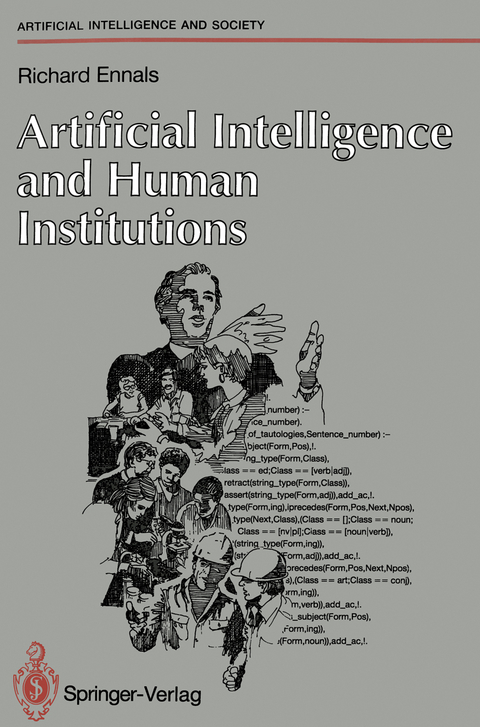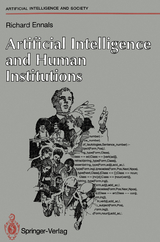Artificial Intelligence and Human Institutions
Springer Berlin (Verlag)
978-3-540-19579-5 (ISBN)
Artificial Intelligence and Human Institutions argues that successful applications of artificial intelligence are possible only within an understanding of human institutions and the limitations of technology. Products of artificial intelligence research are becoming widely available to non-specialists using low-cost computer systems, but there has been a lack of communication between re- searchers and community groups. Taking the "weak AI" position, the book explores the way insights and tools from artificial intelligence can be valuable in coming to terms with real world problems. Drawing on the author's extensive practical experience in AI research and research management, the book brings together case studies from the fields of education, training, business, engineering, defence, health, and community work, and suggests future directions.
This book deals with advanced concepts of artificial intelligence for non-specialist readers, while providing an introduction to state-of-the-art developments. It seeks to use AI concepts to illuminate the practical and theoretical concerns of institutions and organisations, opening up possibilities for new areas of collaborative work, and revealing new sources of references and ideas. This is the latest title in the Artificial Intelligence and Society series and will be of interest to lecturers and students in AI, education, social and political sciences, and business studies.
1. Approaches to Artificial Intelligence.- A Reassessment of Artificial Intelligence.- Artificial Intelligence and Human Institutions.- An Alternative Model of Artificial Intelligence.- Artificial Intelligence as Tool and Institution.- The Artificial Intelligence Debate.- Logic and Problem Solving.- Developments in Applied Artificial Intelligence.- 2 Perspectives from the Humanities.- Knowledge, Information and Data.- Interpretation and Codebreaking.- Logicist Analysis and Artificial Intelligence.- Argument in the Humanities.- Representation.- Quantification.- Modelling with Artificial Intelligence Tools.- Computational Politics: Modelling Bureaucrats.- 3. Education.- Education Before Computers.- Generations of Computer-Assisted Learning.- Presuppositions: Logic Programming and the Culture of the Classroom.- Technology Transfer is Often Accomplished Through People Transfer.- New Partnerships for CAL Researchers.- Integrated Systems: From Theory to Practice.- Evaluation of CAL.- Knowledge Engineering and the Knowledge Society: Process and Structure.- 4. Work.- What are Skills?.- Transferring Skills.- Preconditions for the Transfer of Skills.- Technology and Skills.- Artificial Intelligence and Skills.- Knowledge Based Systems and Work Based Learning.- The Politics of Skills.- Materials Selection, Materials Science and Artificial Intelligence.- Work, Skill and Management.- 5. Computer Systems.- The Two Cultures of Artificial Intelligence and Software Engineering.- Artificial Intelligence and CASE: The Analogy of Pottery.- The New Concern for Methodology.- Current Difficulties in Introducing New Tools and Methodologies into Industrial and Commercial Use.- Prospects for Adding Artificial Intelligence to CASE Tools.- "New Generation Software Technology" Based onDeclarative Systems.- The Logic Programming Initiative.- Problems of Knowledge and Problems of People.- 6. Social Institutions.- Changing Technology and People.- Human Centred Systems.- Commitment.- Artificial Intelligence and Voluntary Sector Groups.- Institutions and Dissent.- The Artificial Intelligence for Society Club.- Social Applications for Artificial Intelligence.- Organisational Preconditions for Collaborative Artificial Intelligence Activity.- New Technology and Human Institutions.- Case Studies in AI for Problem Finding.- 7. Human Resource Development in Information Technology.- The Human Resource Development in Information Technology Survey.- The IT Skills Crisis.- Survey Findings.- Conclusions from the HRDIT Survey.- 8. Politics.- Observing Patterns of Behaviour in Human Institutions.- Artificial Intelligence and Politics.- A Case Study in Politics and Artificial Intelligence: Star Wars.- Modelling Policy and Institutions: The Case of Welfare Benefits.- Artificial Intelligence and Coping with Change.- The Virtues of Virtual Systems.- Intelligence.- Policy Perspectives.- Conclusion.- References.- Name Index.
| Erscheint lt. Verlag | 3.12.1990 |
|---|---|
| Reihe/Serie | Human-centred Systems |
| Zusatzinfo | XII, 181 p. |
| Verlagsort | London |
| Sprache | englisch |
| Maße | 170 x 242 mm |
| Gewicht | 372 g |
| Themenwelt | Informatik ► Software Entwicklung ► User Interfaces (HCI) |
| Informatik ► Theorie / Studium ► Künstliche Intelligenz / Robotik | |
| Mathematik / Informatik ► Mathematik ► Finanz- / Wirtschaftsmathematik | |
| Schlagworte | Artificial Intelligence • Behavior • Computer-Assisted Surgery • Education • Human resource development • Information Technology (IT) • Intelligence • knowledge base • Knowledge Engineering • Künstliche Intelligenz • learning • Logic Programming • Management • Modeling • organization • Problem Solving • programming • service-oriented computing • weak AI |
| ISBN-10 | 3-540-19579-3 / 3540195793 |
| ISBN-13 | 978-3-540-19579-5 / 9783540195795 |
| Zustand | Neuware |
| Haben Sie eine Frage zum Produkt? |
aus dem Bereich




